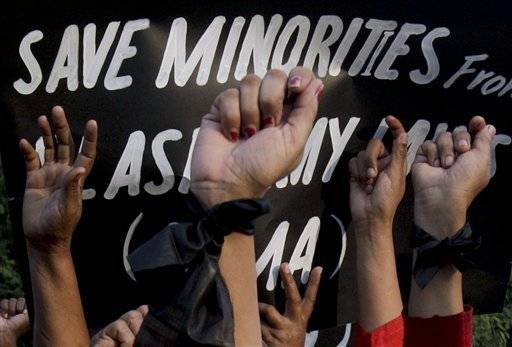Lahore: Any mode of choosing representation for religious minorities, that enhances discrimination on the basis of religion in the political system, will be undesirable. The speakers and participants of the consultation meeting on “effective political participation of religious minorities” held under the aegis of Centre for Social Justice (CSJ) emphasized inclusive policies and mainstreaming the marginalized sections.
The consultation was led by Peter Jacob, the executive director CSJ which was participated by members of mainstream civil society and political, religious and social actors of different faith communities. The participants said that the existing mode of proportional representation system for minorities met the fundamental requirement of democratic participation, thus appropriate, instead of a dual vote or direct election on the reserved seats. They reiterated that joint electorate system was imperative for democratic dispensation as well as promoting democratic values and improving social harmony.
Ruling out the use of dual vote or direct vote for minorities they said that the prepositions would mean return of the separate electorate system, with its detrimental effects to the national fabric and social cohesion. The direct or separate electorate system for minorities had been experimented during 1985 and 1997, which failed badly, caused political marginalization and social exclusion of religious minorities. This discriminatory system on the basis of religion was removed in 2002 on the demand from minorities.
The participants of consultation resolved to place following demand in the electoral reforms bill 2017 being presented in the parliament, for effective political participation of religious minorities;
1) The reserved seats for minorities should be filled with an eligibility criteria and larger participatory process through intra-party elections rather than chosen by a committee of few.
2) The reserved seats for minorities in the National and Provincial Assemblies have seen no increase since 1985, therefore these must be enhanced in spirit of affirmative action and allocation should consider a guaranteed representation of smaller communities such as Sikhs, Kalash.
3) More categories of reserved seats such as, persons with disability, peasants and labourers should be added to give voice to these marginalized sections of society.
4) Concrete steps should be taken to remove discriminations in other spheres such as the education system to give effect to the religious freedom and equality of rights guaranteed in the articles 20 and 25 of the constitution of Pakistan.
5) The political parties should adopt criterion to ensure representation from regions /divisions of Pakistan.






